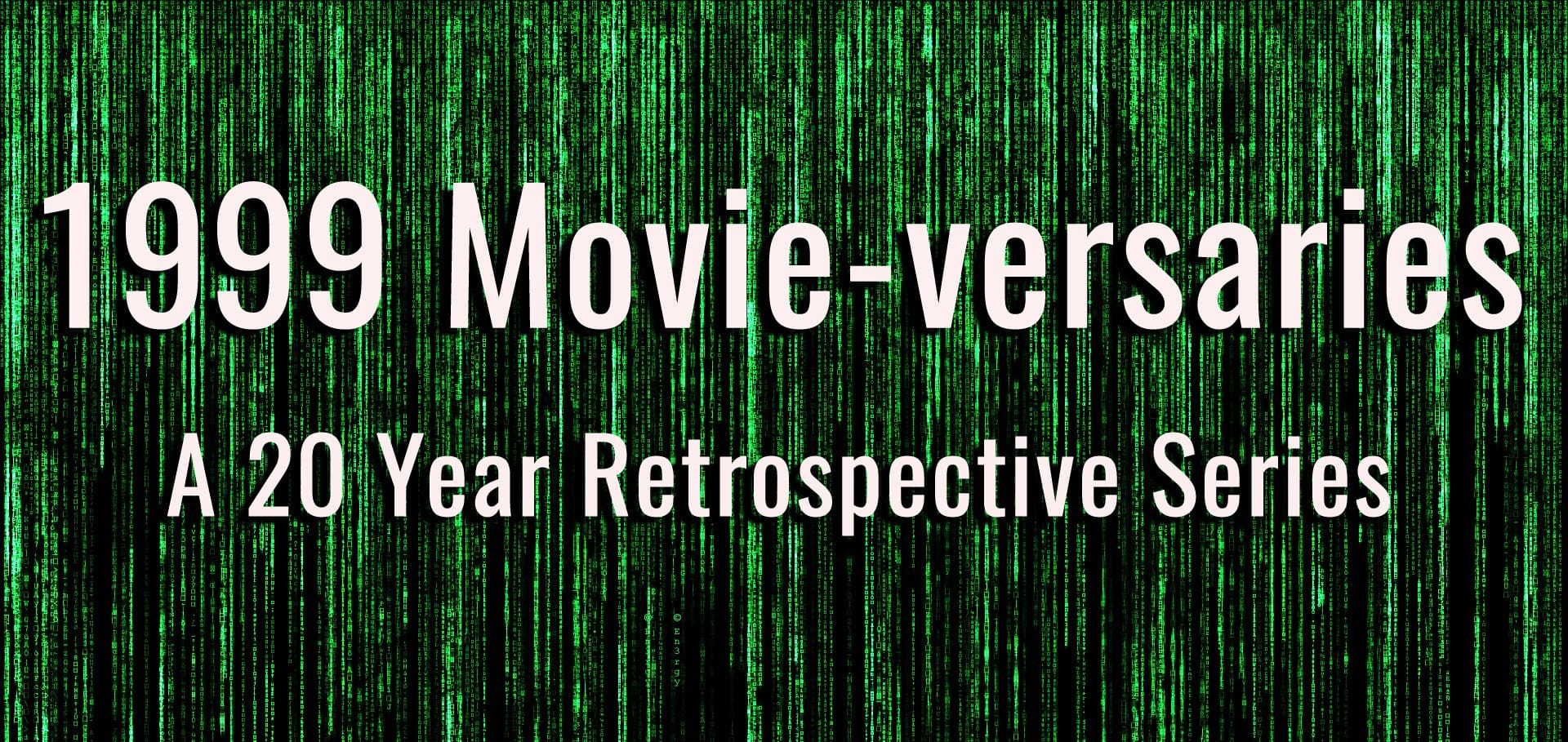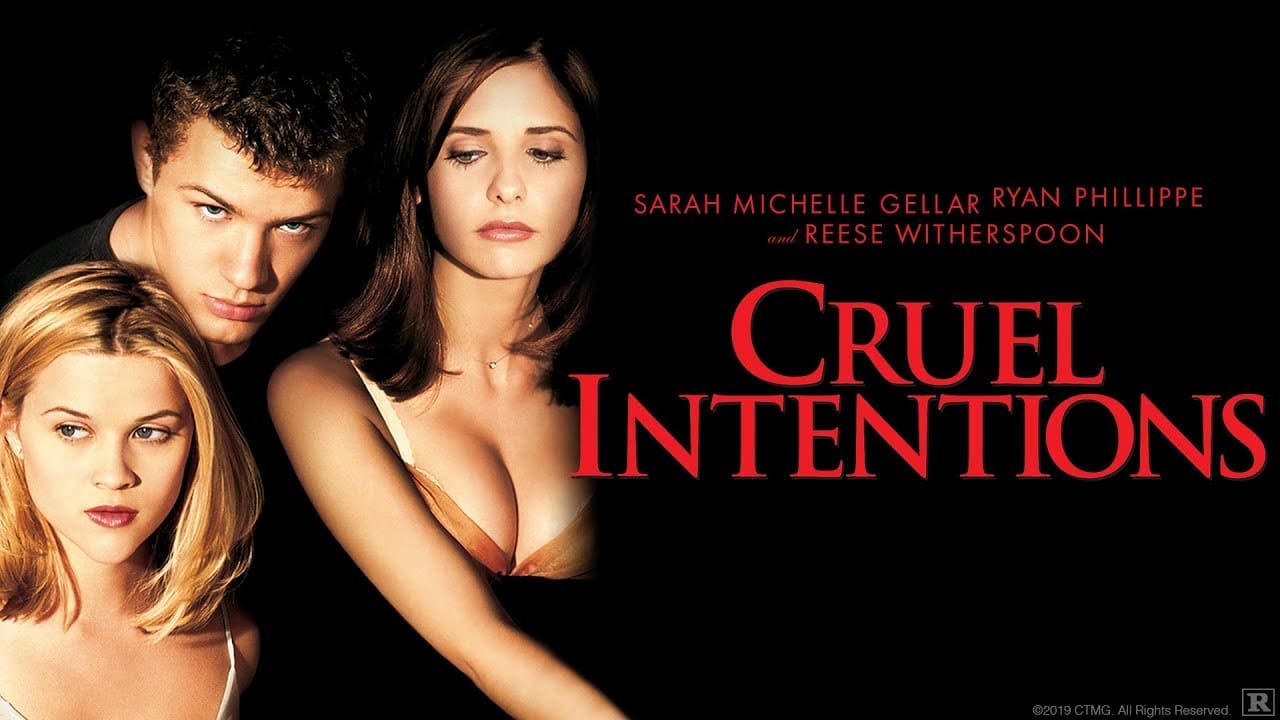1999 was a big year for movies. It was the year that The Matrix‘s slow-motion bullet influenced action movies for years to come. It was the year American Beauty won Best Picture at the Academy Awards and Oscar fans have been arguing about it ever since. It was the year Pokémon jumped from Gameboys and TV to the big screen. And worst of all, it was the year that disappointed a generation of Star Wars fans with the release of The Phantom Menace.
To celebrate that landmark year in film’s 20th Anniversary, The Pop Break continues its year-long retrospective of 1999’s most influential (at least to us) films with staff writer Matt Taylor reflecting on the movie that taught him being bad could be good, Cruel Intentions.
When you think about it, Cruel Intentions feels like an anomaly of sorts today. It’s a hard-R erotic thriller boasting a cast of teen idols and made, if we’re being honest, for young viewers who couldn’t get into the theater without a parent. It’s honestly difficult to imagine adults watching this movie for the first time–in 1999 or today–and walking away with a positive impression. It’s an incredibly silly movie with characters that act illogically, is filled with questionable acting choices, and boasts a broken moral compass that certainly hasn’t improved with age. Right down to its alt-rock laden soundtrack, Cruel Intentions feels like a product of its time—a movie that only ’90s kids will remember liking, even if they probably shouldn’t have watched it in the first place.
It was awesome.
The graphic sexual dialogue is made up entirely of euphemisms for sex acts that are most definitely only used in the movies. The way these characters spend their days plotting against one another, apparently untethered by the typical challenges that teenagers face like, I don’t know, school. The glimpse of Ryan Phillippe’s butt that shocked Reese Witherspoon at the time of its release and is still talked about on Twitter and Tumblr today. And, of course, the legendary kiss between Sarah Michelle Gellar and Selma Blair that they’re still recreating on red carpets today.
While straight boys may have had American Pie to teach them (the wrong lessons) about sex, queer boys and girls had Cruel Intentions. It wasn’t the role model we needed, but it sure was fun to watch. And while we’d have to, eventually, unlearn all the toxic lessons about dating that it burned into our brains, there’s one thing it taught us that we don’t have to feel guilty about: to appreciate great camp.
There’s one scene from Cruel Intentions that was burned into my brain when I was 12-years-old. Sarah Michelle Gellar, so good as the vindictive instigator Katherine Merteuill, is forced to defend her manipulative ways to her step-brother Sebastian. Without skipping a beat, Katherine launches into a monologue about how men, including her step-brother, sleep around all they want without being called out by society. She ends her monologue with the iconic line, “I’m the Marcia fucking Brady of the Upper East Side, and sometimes I want to kill myself. So there’s your psychoanalysis, Dr. Freud.” Before I even knew what the word meant, the scene had me shook.
Now, Katherine is not a good person. She’s the villain of the film, and she does terrible things to a lot of innocent people. And the monologue, in the context of the film, doesn’t even make sense. It doesn’t make sense that Sebastian would ask his step-sister that question at that time. In fact, most of Katherine’s evil plot makes very little sense, and at no other point does she or any other character interrogate the sexist double standard about casual hookups that inspired her monologue. And, it bears repeating, these characters are supposed to be teenagers but talk like adults who have already grown weary of the world. This scene, like much of the film, makes no sense, and while the speech is rooted in truth, its a truth that never once comes up in any other scene of the movie. But SMG absolutely kills the monologue… it’s a thrill to behold.
This scene broke my brain at 12 years old. I knew that I loved movies, and I so badly wanted to pursue a life in film criticism. My weekends would start with a trip to my local library, where I’d rent the VHS tapes of whatever I could get my hands on. And as I was trying to formulate a mature understanding of what constitutes as “good” and “bad” cinema, Cruel Intentions challenged everything I thought I understood about both sides of the quality spectrum. I knew this movie was silly, and was as far from realism as possible. And while I liked watching Sarah Michelle Gellar and Selma Blair fully commit to these outrageous characters, I couldn’t tell if it was good acting in the traditional sense of the word. So, I used every excuse I could to defend this movie… calling it a “guilty pleasure” or “so bad it’s good.”
But I knew that wasn’t really what I thought. Cruel Intentions became my gateway drug into other erotic thrillers – from Wild Things to Fatal Attraction to Basic Instinct. The films I’d rent progressively became more conventionally accepted as “good” until I finally graduated to the works of Brian de Palma, whose filmography earned the stamp of approval from the straight white men who, throughout much of my formative years, served as the gatekeepers for what made valuable cinema. But what made those films–which I also loved–any different from the movie that started my affection for the genre?
It would take me years to unpack my love of camp and, for those who haven’t caught on yet, it was closely related to having to unpack my sexual orientation (don’t worry, it took me years to figure that out, too). But it’s funny to watch Cruel Intentions today, in an age where the film–and even mainstream ’90s cinema as a whole–has been reevaluated. ’90s nostalgia is trendy now, to the point where some films that are decidedly bad are remembered as classics. Cruel Intentions lives on as GIFs, and has even spurred a jukebox musical (which is terrific, I might add). The film I spent most of my teen years secretly loving is now looked back at fondly, at least in the snob-free corners of the Internet. And that’s exciting!
I certainly didn’t realize it at the time, but while I wrote Cruel Intentions off as my exception to the rules of great filmmaking, it actually ended up being one of the more formative film experiences of my life. The reason that we’re seeing a revival in romantic comedies, tawdry thrillers, and other “disposable” genres is, I think, because we’re finally questioning who gets to decide what makes good films. The idea that a certain film is predetermined as “lesser” because of its genre or tone is rightfully seen as silly, and the act of taking the same rubric to all movies, at least for me, feels hopelessly antiquated.
But as a teenage viewer, I took away points from a movie because I perceived something as campy or over-the-top. I’d watch a movie like Cruel Intentions and love it to pieces, more than some of the more serious-minded movies that the Internet told me to appreciate. I was afraid to admit I liked this movie…just as I was afraid to admit that I was crushing hard on Ryan Philippe, or audibly gasping at every outfit Sarah Michelle Gellar wore onscreen. The straight teen movie nerds I’d talk to both in real life and online made no apologies for loving silly action films from the era—yet I thought it was embarrassing to enjoy campy movies like this which, if we’re being honest, are just as unrealistic and over-the-top as a Transformers movie, or the latest Marvel release. They’re two sides of the same coin: strictly entertaining cinema.
But, even with all that emotional unpacking I had to do, I think I experienced my formative years at just the right time. As I became more comfortable with my sexuality, there was a change in film culture. There’s still a lot of work to be done, but it gives me comfort to know that young, closeted film geeks can stumble upon Cruel Intentions and actually find a community online to express an appreciation for it without fear of being judged or shamed. I hope straight-male film nerds, who still disproportionately dominate the conversation across the Internet, check themselves about the movies that they deem silly or unimportant, and consider the multitude of opinions that make up the film community before making generalizations about film taste. And, as for me…I look forward to returning to movies I dismissed during my years in the closet, and figuring out what my authentic view on the film really is. Bring on more trash!




Awesome look back! Blew my mind at 13, and further solidified my forever crush on SMG.